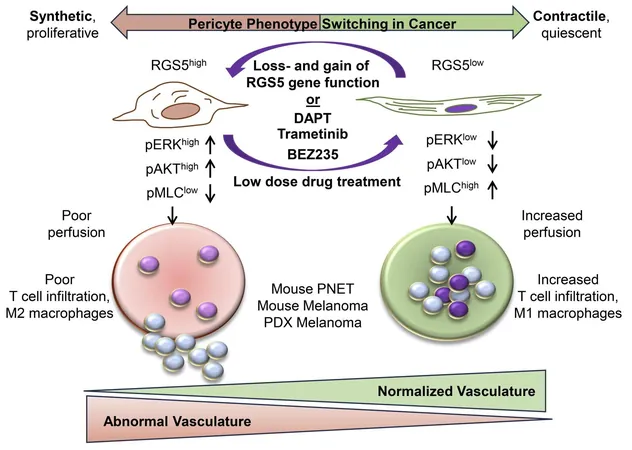
Revolutionary Cancer Treatment: Lowering Drug Doses Could Unlock the Power of Immunotherapy!
2024-09-18
Introduction
In a groundbreaking study conducted at the Harry Perkins Institute of Medical Research in Perth, scientists have discovered that drastically reducing the dosage of anti-cancer drugs—up to a hundred-fold lower than traditional treatments—may enhance the effectiveness of immunotherapy against stubborn tumors.
Understanding Tumor Microenvironments
Professor Ruth Ganss, a leading researcher in cancer microenvironments at the University of Western Australia, has been dedicated to understanding the intricate surroundings of solid tumors. This microenvironment is often comprised of dense, "sticky" tissues and blood vessels that nourish the cancer cells, rendering tumors resistant to standard treatments. Traditional high doses of chemotherapy can exacerbate this issue by further thickening these barriers.
Key Findings
Published in the esteemed Journal of Clinical Investigation, Prof. Ganss's recent findings reveal a fascinating twist: although tumors initially may grow in response to the reduced drug dosage, the surrounding blood vessels begin to normalize. This normalization paves the way for immunotherapy, allowing it to penetrate deeper into the tumor and significantly boost its efficacy.
Potential for Transformative Treatments
“Our research represents a potentially transformative approach to treating aggressive cancers such as melanoma, brain cancer, and pancreatic cancer,” stated Prof. Ganss. She emphasized that the anti-cancer agents involved in their study are already approved for clinical use, which accelerates the potential for rapidly implementing new dosing strategies into treatment regimens for patients.
Collaborative Efforts
The excitement extends beyond her lab, as clinical collaborators have expressed eagerness about the possibility of combining this innovative drug administration technique with immunotherapy. Prof. Ganss and her team are now gearing up for the next phase: clinical trials involving patient tissue samples from difficult-to-treat cancers.
A Hopeful Future
By leveraging clinically approved drugs to alter cancer blood vessels, the researchers hope to foster improved outcomes for critically ill patients, potentially extending their lives and enhancing the quality of their remaining time.
The Research Team
Joining Prof. Ganss in this research endeavor are notable experts such as Professor Jonas Nilsson, Head of Melanoma Discovery, and Professor Alistair Forrest, Head of Systems Biology and Genomics, along with a team of international scientists from the U.S. and Germany.
Conclusion
This shift in cancer treatment paradigms is not just promising; it's a beacon of hope for those battling against some of the most challenging forms of cancer. As the research moves towards clinical application, the medical community is abuzz with anticipation—could this be the breakthrough that transforms cancer care as we know it?




 Brasil (PT)
Brasil (PT)
 Canada (EN)
Canada (EN)
 Chile (ES)
Chile (ES)
 España (ES)
España (ES)
 France (FR)
France (FR)
 Hong Kong (EN)
Hong Kong (EN)
 Italia (IT)
Italia (IT)
 日本 (JA)
日本 (JA)
 Magyarország (HU)
Magyarország (HU)
 Norge (NO)
Norge (NO)
 Polska (PL)
Polska (PL)
 Schweiz (DE)
Schweiz (DE)
 Singapore (EN)
Singapore (EN)
 Sverige (SV)
Sverige (SV)
 Suomi (FI)
Suomi (FI)
 Türkiye (TR)
Türkiye (TR)